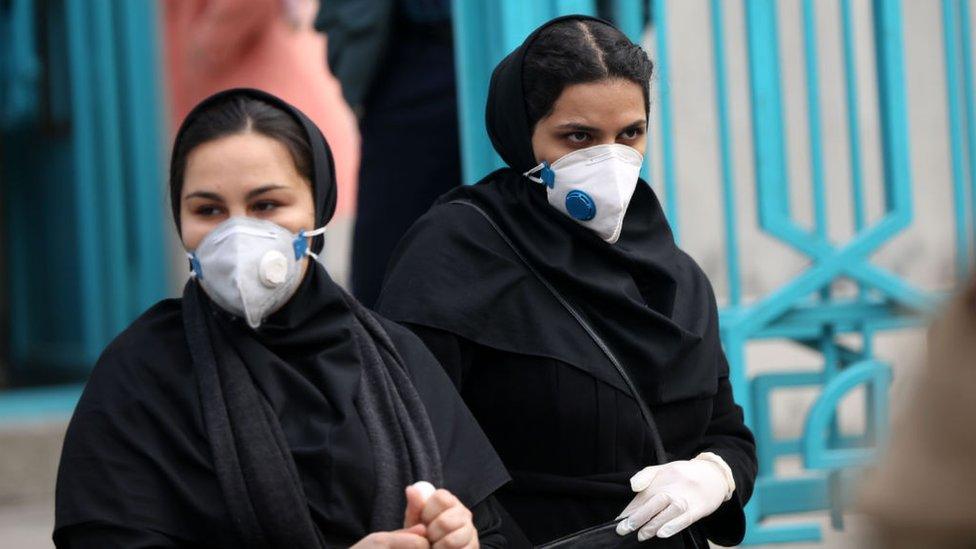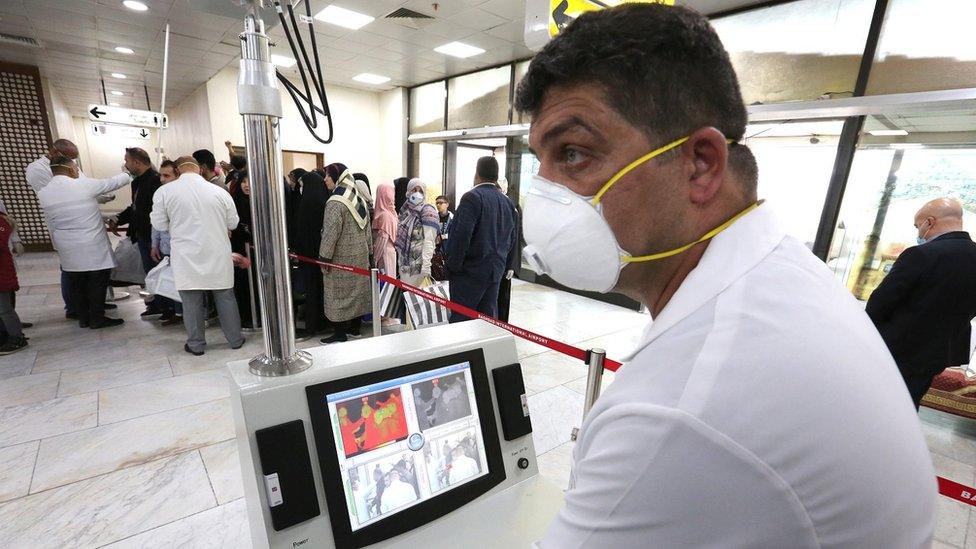Coronavirus: Gulf states suspend more flights
- Published
- comments

Gulf states have imposed more flight restrictions in an effort to try to slow the spread of the coronavirus outbreak.
The United Arab Emirates (UAE) has suspended all flights to and from Iran apart from Tehran.
Bahrain has suspended all flights to and from Dubai and Sharjah in the UAE until further notice.
Oman, Jordan, Kuwait, Iraq and Saudi Arabia have already suspended flights to Iran after cases there.
Airlines around the world have been forced to reduce flights as countries try to stop the spread of the potentially deadly disease.
On Tuesday, Dubai's airport authority said that it had suspended all flights to and from Iran with the exception of the capital Tehran.
Passengers arriving from Tehran will be screened, it said. Customers have been urged to contact their airlines if they need to rebook flights.
In addition, the Kingdom of Bahrain has suspended all scheduled passenger flights to and from Dubai until further notice, the airport authority said.
On Monday, Iraq, Afghanistan, Kuwait, Oman and Bahrain reported their first cases of coronavirus, all involving people who had travelled from Iran.
On the same day Iran denied a cover-up over how many there had died from the disease.
To try to prevent the spread of the virus, Iranian authorities have ordered the nationwide cancellation of concerts, football matches, and closures of schools and universities in many provinces, as a precaution.
The global airline industry body, the International Air Transport Association (IATA), warned on Friday that airlines stand to lose $29.3bn (£23.7bn) of revenue this year due to the effects of the virus.
IATA predicted that demand for air travel would fall for the first time in more than a decade.
Last week, airlines Qantas and Air France-KLM warned that their earnings would be hit as a result of the coronavirus dampening demand in Asia.

Analysis:
By Sameer Hashmi, BBC Middle East business correspondent

Bahrain's decision to suspend all flights to and from Dubai might seem dramatic but it is also a sign of fear that has gripped governments in the Middle East.
Cases of the coronavirus emerging in the last few days in the United Arab Emirates, Oman, Bahrain, Kuwait, Lebanon and Iraq are all linked to Iran, which has emerged as the epicentre of the virus in the region.
More than 400,000 Iranians are estimated to be based in Dubai. The city is the main business hub between Iran and the rest of the Middle East.
Kuwait - where the number of confirmed cases has risen to eight - suspended all national day public celebrations on Tuesday and has also banned sports activities in the country for the next two weeks.
The outbreak of the epidemic in Iran is a blow for the country's economic health, which is already being strangled by sanctions.

Coronavirus effects
Stock markets plunged around the world on Monday after fresh coronavirus cases renewed fears about a global economic slowdown. Shares in airlines and travel companies were hit particularly hard.
Oil prices have also fallen sharply on fears that the slowdown in economic activity - particularly in China - will affect demand.
A number of firms have warned of the effects of coronavirus on their trade.
On Tuesday, Dutch consumer and health electronics firm Philips warned that the outbreak was affecting demand its goods in China, and was also hitting its global supply chain.
Apple said last week that its revenues would fall short of forecasts, with iPhone supplies "temporarily constrained" worldwide due to disruption in China from the coronavirus.
- Published26 February 2020

- Published25 February 2020

- Published21 February 2020

- Published20 February 2020

- Published18 February 2020

- Published18 February 2020
